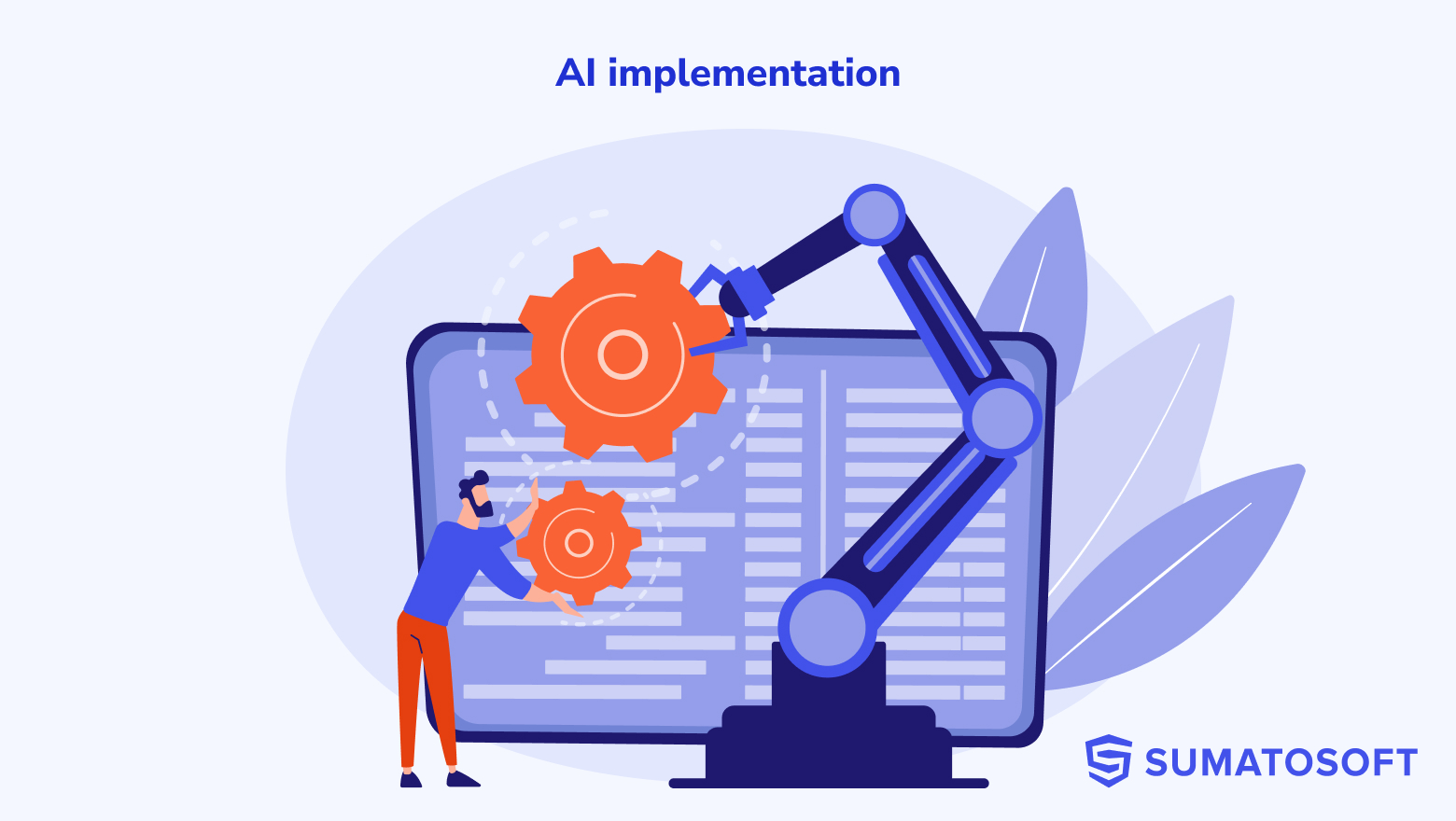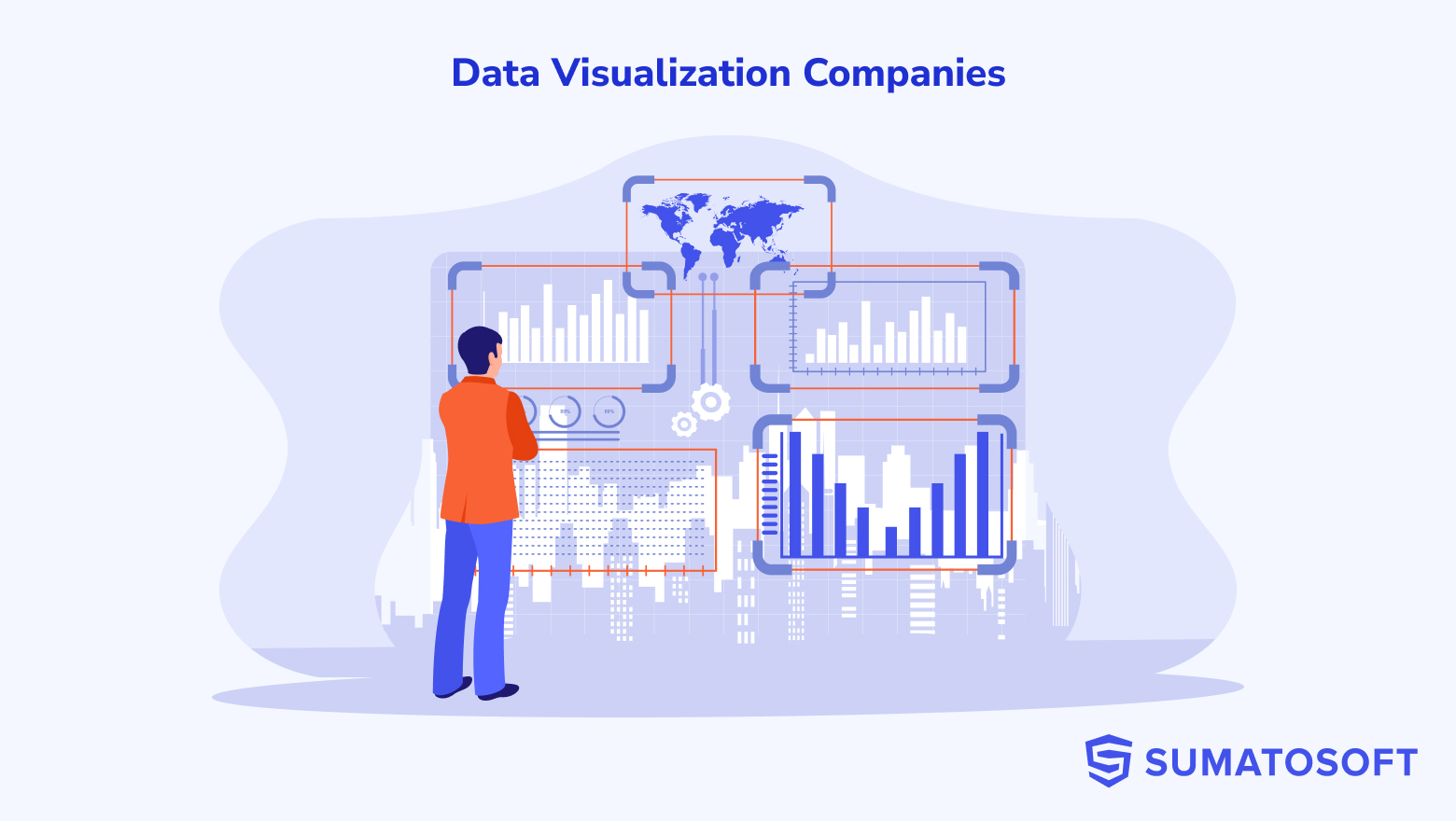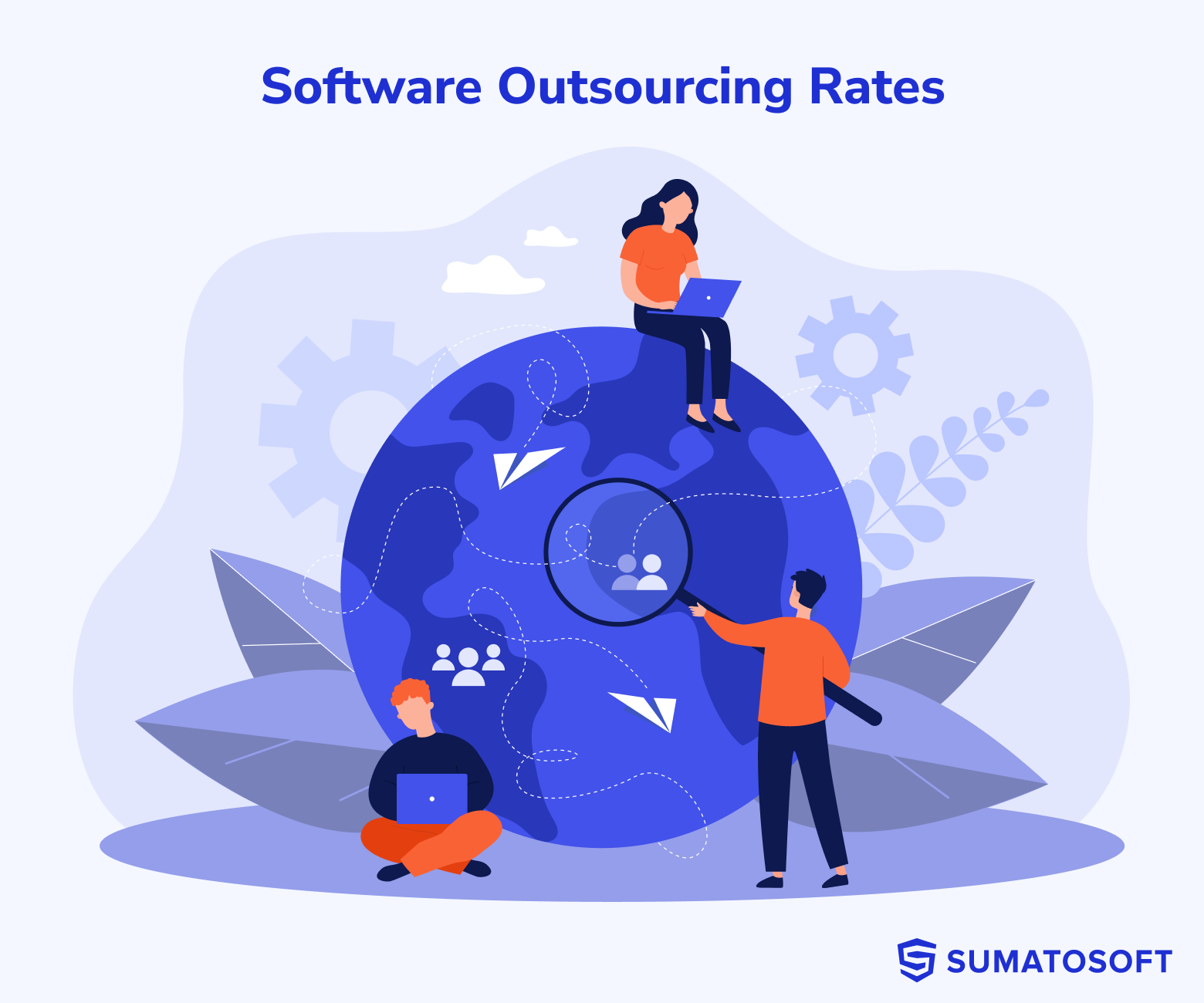How to Successfully Outsource Your Mobile App Development


At the 2011 IAB Annual Leadership Meeting, Eric Schmidt, then-CEO at Google, stated:
“Mobile use is growing faster than all of Google’s internal predictions.”
Two years later, speaking to Bloomberg about his predictions for the year 2014, Schmidt made an even more definitive statement:
“The trend has been that mobile was winning. It’s now won.”
We can see that he was entirely accurate in his statements with 86% of the global population being smartphone users in 2024.
As people are becoming more attached to their mobile devices, both enterprises and startups are eager to develop mobile applications to engage with their customers directly.
This article is devoted to outsourcing mobile app development to a professional software development provider, like SumatoSoft.
Why Outsourcing Mobile App Development Makes Sense
According to Deloitte research in 2020, there are 5 primary reasons companies outsource their software development.
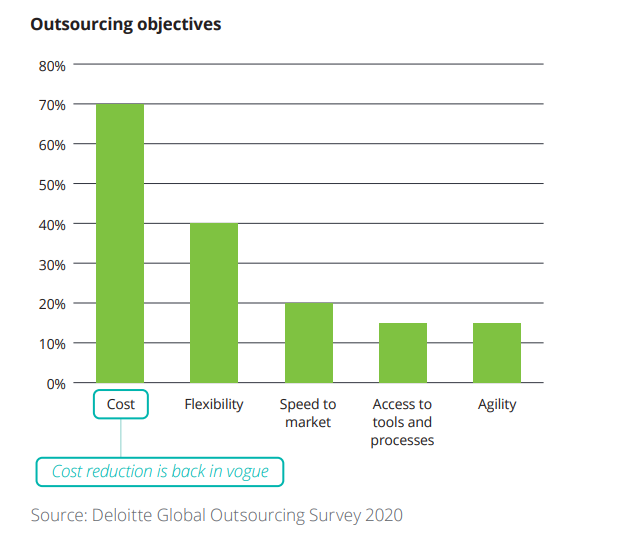
Cost Reduction
Cost reduction is the most popular reason for mobile outsourcing because it cuts operating costs and recruitment costs. See the example:
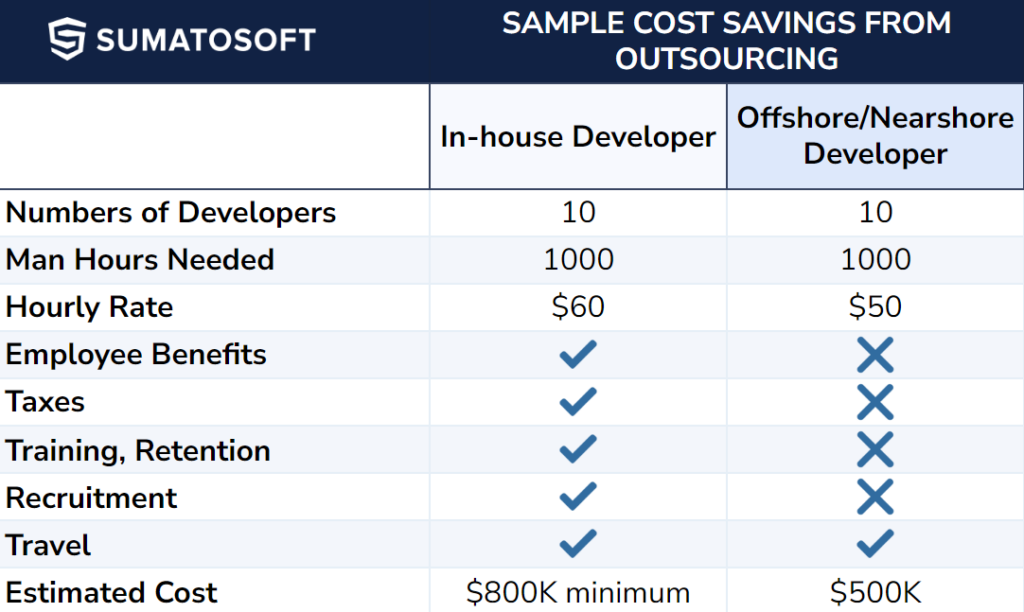
These numbers are approximate and vary depending on the developer’s location and expertise. Still, outsourcing enables the reach of regions with lower living costs such as Eastern Europe, South America, or India. Check our article about software outsourcing rates to learn more about each region.
Flexibility
Flexibility in outsourcing means several things:
- Flexibility in team size – If you need to speed up development or reduce monthly costs, you can change the team size in one call with an account manager.
- Flexibility in skill composition – outsourcing enables the reach of the global talent pool with a recruitment period of less than one month.
- Flexibility in costs – the most popular outsourcing model is time & material, implying that businesses only pay for resources they have used over the past period. So no fixed costs associated with permanent employees.
Example:
We cooperated with a reputable real estate brand in Austria for 5 years, varying the team size from 4 to 9 specialists depending on the project needs and budget. The result of such cooperation is a comprehensive and working system that consolidated the Client dominance in the market. We described it in the case study.
Speed-to-Market
Outsourcing is famous among startups because it allows them to develop and launch products quickly, thanks to the Agile software development model. Agile practice, in some form, is adopted by 85% of IT organizations, mostly because of its quick time-to-market offering.
Example:
The AI boom in 2022 after introducing ChatGPT inspired multiple startups to experiment with AI opportunities. Several businesses have already referred to us, and I want to tell you about one of them. It was a startup from Canada that decided to use AI for online clothing try-ons so users could see how they would look in the new clothes.
We developed a functional MVP within one month.
How to Outsource Mobile App Development: 4 Steps
Step 1: The App’s Concept
Without any doubt, the first thing for you to do is to fill in the questionnaire covering all the important aspects that are substantial for the pre-development stage. The most common questions at this stage are these:
- Describe the mobile application concept.
- What are the main business goals the application should help to reach?
- What platforms do you want your app to run on? (IOS / Android, IOS – iPhone, OS – iPad, Android smartphone, Android tablet)
- Who is the app to be aimed at? Describe your target audience.
- What’s the concept for the app? Do you have any creative/design specifications for the application?
Document answers, align them among all stakeholders, review and validate them so you can easily explain them to developers for analysis and estimation.
Of course, there are more questions to consider. But even answering these allows you to shape the concept of the future mobile app. Check out the rest of the questions (and even download a special questionnaire) in the article.
Step 2: Looking for Mr. Right
You should always pay attention to the quality of outsourcing. Strictly speaking, when contacting your potential partner, you should never consider their price proposal as the main competitive advantage. Just do some research, and you’ll see that way too often, negative reviews contain two notions: “They declared the lowest prices in the industry” and “We got unsatisfying results. “
In the long run, a low-quality application means you will have to pay more than you expected during the initial development just to redo everything correctly. And I’m not speaking about other consequences of dealing with unprofessional service providers, such as missed deadlines, frustration, and complete project cancellation.
Concentrate on the service provider’s expertise, the way they work, and corporate values to avoid this unpleasant situation and find the best-matched company. Here is a brief list of questions for this:
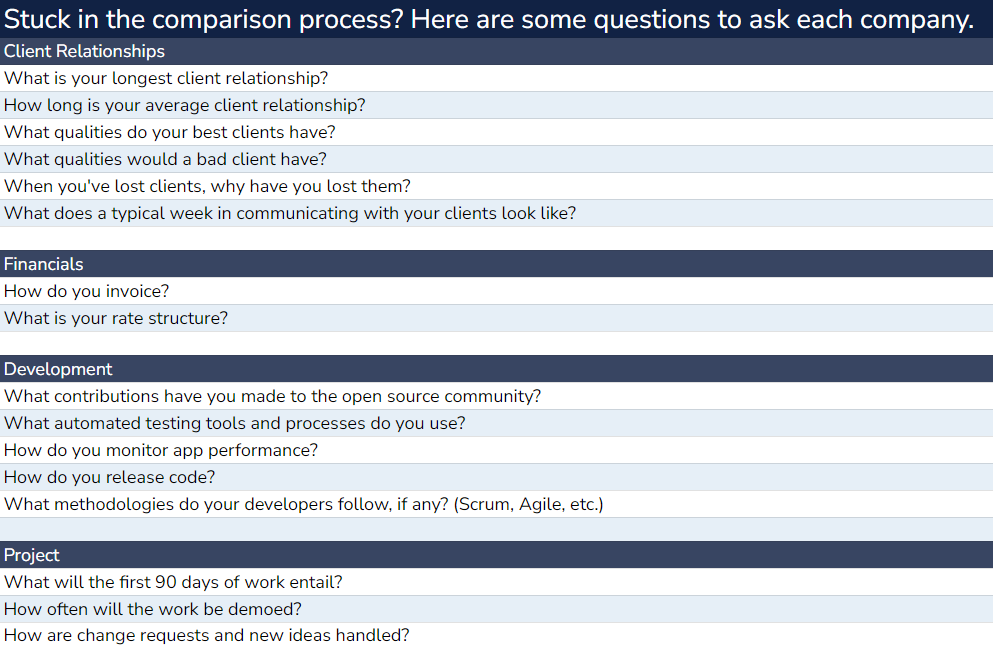
Moreover, try to find a company that is hiring versatile developers. This is significant because every problem should be approached in a different way. Companies using only one technology will approach the issue from their tech stack’s perspective, which sometimes may lead to wrong development decisions.
We wrote a whitepaper on the topic of choosing the software development provider. Besides steps, questionnaires, and our advice on how to find the identify professional software development companies, we summarized the most common red flag of unprofessional service providers.
Step 3: Are We on the Same Page?
At this stage, there are two things to pay attention to. The first one is that you have to choose a company that fully understands your business goals. The second one is that your technology partner shouldn’t have any cultural gaps with you.
Effective communication is an essential part of outsourcing app development. No language barrier, different working style, lack of clarity in talks, or feedback misinterpretation should hinder your communication.
If neglected, the risk of getting poor end results is only growing. The problems in communication may not be evident until it’s too late, so it’s smart to make sure you’re on the same page. Alternatively, you can use a small trial project to test how closely the deliverables match your requirements.
At this stage, an experienced Project Manager is your best friend. Make sure that your PM has deep technical knowledge and can assist you with issues that may occur during development.
As of today, more and more entrepreneurs tend to choose companies from Eastern Europe, as local developers offer good prices and quality and are strict with deadlines.
Step 4: Project Scope
Once you’ve signed the contract, your technical partner will start working on your mobile app.
The common question here is “How long will it take to develop my app?” While there’s no general rule, the most common answer is about 4-6 months.
The most common period for mobile app development is 4-6 months.
To get things done properly, you should discuss a number of deadlines for specific milestones of the project. Setting up project milestones lets you track the progress of the outsourcing company’s efforts and gives you an idea of project completion.
From your part, the key concern during this part of the process is to keep in touch with the team on a daily, maximum weekly basis. During stand-up meetings, developers should give you a demonstration of their progress, explain various features, and give you an opportunity to try out your app.
The final piece of advice: don’t rush simply because you want to get your project completed. Remember that proper project requirements and patience result in successful and satisfactory project completion.We’ll be glad to answer all your questions about the process of app development or share our experience of developing mobile applications. Feel free to leave them in the comments or drop us a line here.
Risks Of Outsourcing Mobile App Development
If you Google the phrase “Risks of outsourcing,” you’ll see 24 potential risks associated with outsourcing!
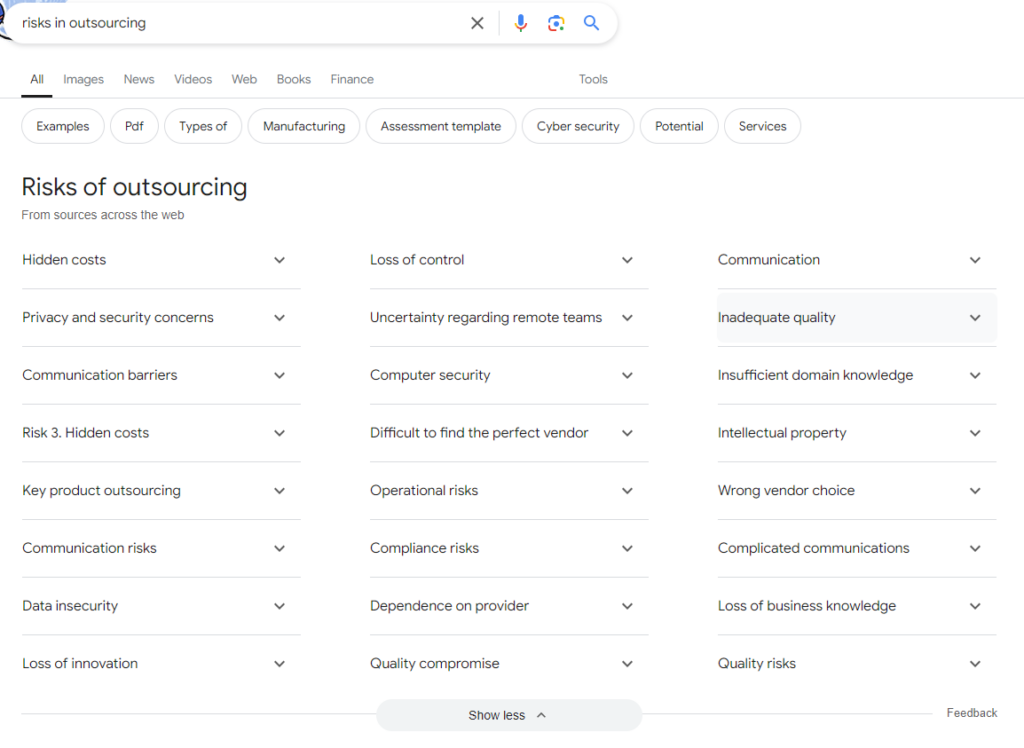
After looking at this list, even I begin to question whether outsourcing is worth it. However, only 5 of these risks are actually significant. We identified them through knowledge exchange with other outsourcing companies and direct feedback from our Clients who shared their previous bad experience with outsourcing.
These risks are well-known, and their way-outs are well-defined.
Here is a brief list of them:
- wrong vendor choice – this has the most widespread risk;
- lack of control – businesses have limited control over an outsourcing team;
- poor software quality – it’s part of the previous two risks, but deserves special attention;
- intellectual property theft – there are cases when service providers exploit their Clients innovative ideas or technological choices for their own benefit;
- communication and cooperation issues such as language barriers, cultural fit, working time differences, etc.
Now, let’s examine them in detail.
Risk #1: It’s Easy to Run Into an Unprofessional Service Provider
There are approximately 28.7 million software developers globally and 38,000 software development companies on Clutch. Their services vary in the industry focus, technologies they use, budget, availability, solutions they deal with, etc.
Most outsourcing companies are professionals, but some firms have no experience or skills in developing quality software solutions and are actively selling their services. We, at SumatoSoft, helped several Clients who approached us with poorly developed non-working software without any documentation.
Choosing the right software service provider isn’t rocket science, but it still requires some preparations. This is the most critical risk to address.
Mitigating the Risk of Choosing a Vrong Development Company
- The first step is to avoid placing excessive emphasis on service costs when choosing the vendor. A significantly lower development price compared to the industry average might be a red flag.
- The second step is to check our guide on how to find the right software development provider. It contains specific steps, questions to ask, a template comparison sheet, and some unique advice from our team.
Risk #2: Little Control Over an Outsourcing Team
Let’s imagine a business owner Arnold who hires an outsourcing team to develop a mobile application. What exactly does “I hired an outsourcing development team” mean? It means the following:
- There is a group of specialists who work on Arnold’s project. The project is probably one among many others the outsourcing company has. It differs in case Arnold hires a dedicated team – such a team works solely on one project.
- The team works in an office in a different city or country. Arnold can’t drop by and see if they work or ask them “How is the project going?”
- Arnold can’t oversee their day-to-day activities to ensure that there is real progress. The team might do something a day before the demo to showcase the progress when it’s absent de facto.
- An outsourcing team may prioritize other projects that affect the quality and timelines.
- The only control point is demo meetings and communication with a project manager, who can embellish the actual status to put the outsourcing company in a good light.
And that’s only part of the control issues.
Mitigating the Lack of Control Risk
There are several strategies and methods for ensuring the proper control of the project:
- The best way for Arnold to mitigate this risk is to find a reliable and conscientious development service provider, so this risk only appears if Arnold ignores our advice when choosing the development company.
- The contract must clearly state deliverables, timelines, milestones, project goals, and quality requirements. Regarding quality, we recommend metrics like feature completeness, defect density, cross-platform compatibility, code coverage, and initial requirements compliance.
- Establish regular check-ins to discuss progress, updates, and status, and see the demo of the work done. This is the most effective way that we at SumatoSoft leverage with our Clients.
- Assign a dedicated liaison with technical expertise who can check the technical aspects of the solution.
- Establish a clear procedure in case of urgent issues or concerns.
- Foster an open and collaborative relationship.
Risk #3: Poor Final Software Quality
In case Arnold decides to skip our guide on choosing the right software development provider and ways to establish control over an outsourcing development team, it leads us to the third risk: poor final software quality.
Poor software means it behaves unexpectedly, fails sometimes, has slow load time, laggy interfaces, unsecure architecture, missing features, unstructured code with poor readability, lack of documentation, and other unpleasant characteristics.
Poor software quality is a direct result of ignoring the previous two risks.
Mitigating the Poor Software Quality Risk
- The first step is to check out relevant info on how to choose the software development company, establish regular check-ins, and clearly articulate the key deliverables, milestones, project goals, and timelines. In other words, address the first two risks.
- Set up the acceptance criteria – we at SumatoSoft usually agree upon code coverage, an acceptable number of bugs after the release, and the absence of critical bugs and blockers.
- Review the software regularly after every demo and major release – don’t wait until the last release.
Risk #4: Intellectual Property Theft
Most companies value their reputation and Client trust, so they don’t exploit others’ ideas or proprietary technology. Still, there have been several cases when companies replicated the Client’s intellectual property for their own benefit or reused them to develop a similar product for another Client.
Mitigating the Intellectual Property Theft Risk
- Sign a non-disclosure agreement from the start even before sharing the initial idea with the company – this document is a basic protection measure that legally protect sensitive information.
- Use intellectual property contracts in case in case of dealing with innovative products. It allows to define ownership rights and usage terms clearly.
Risk #5: Language, Cultural, and Other Barriers to Cooperation
5 regions are famous for their different outsourcing opportunities: Eastern Europe, India, Asia, Mexico, and the U.S. Every region has its own advantages and disadvantages that we described in another article software outsourcing overview.
The most prominent outsourcing location is Eastern Europe thanks to its cultural compatibility, cost-effectiveness, skilled workforce, and other advantages that make communication with companies from this region convenient and effective.
Still, two other regions – India and Mexico – have gained traction in recent years thanks to their extremely inexpensive services. The opposite side of these regions is barriers to cooperation which are:
- Language barrier – English proficiency in these regions isn’t great.
- Cultural fit – different work cultures, practices, expectations, and hierarchies affect the team dynamics and project execution.
- Working time difference – India is located in South Asia with UTC +5:30, and Mexico is in North America with UTC from -6 to -8. These are two extreme time gaps with other countries.
Mitigating Cooperation Barriers Risk
- Conduct cultural training is the top priority task when dealing with companies with a distinct culture. The majority of frustration, unmet expectations, and conflicts could be solved by training both teams to bridge gaps and enhance collaboration.
- Schedule regular meetings where all team members can discuss the status, updates, and issues.
- Encourage openness and transparency in communication.
- Use bilingual staff or professional translators to ensure everybody stays on the same page and avoid misunderstandings.
- Document every agreement, decision, requirement, or priority change.
- Develop a contingency plan for handling urgent issues or communication breakdowns.
SumatoSoft encourages you to look for companies that fit your culture and have proficiency in your language. If it’s not an option for some reason, the methods above ensure effective communication and lay the foundation for the project’s success.
How Much Mobile App Development Outsourcing Costs
The easiest and most accurate way to determine mobile app development costs is to request quotes from development companies. For example, we at SumatoSoft provide a free project estimation when Clients contact us. We draft the project scope, examine business goals and requirements, assess risks, define the list of deliverables and prepare estimations.
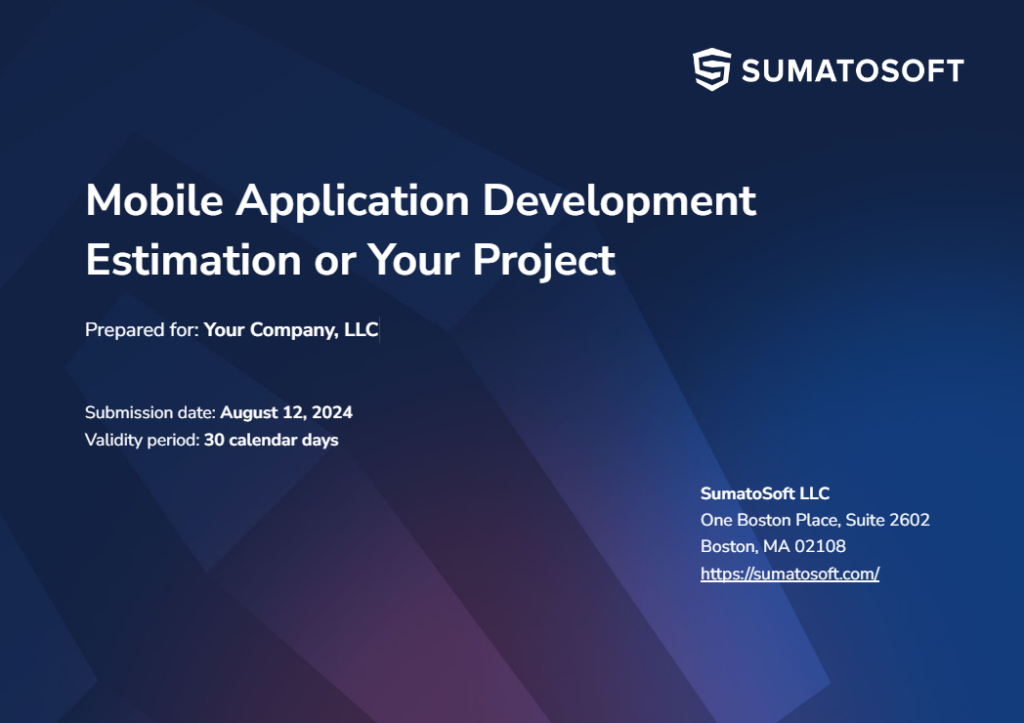
The exact cost range in absolute numbers is extremely wide depending on such factors as developers’ location, experience, skills, technologies needed, and more.
So, let’s refer to approximate numbers. I can share the following average costs of our previous mobile app development products split into three groups:
| The project complexity | Timeframes | Approximate cost |
|---|---|---|
| Simple | 1-2 months | ~$20,000 |
| Medium | 4-6 months | ~$50,000 – $100,000 |
| Complex | 12 months + | $300,000+ |
Simple Mobile Application
Simply application means a fully functional bug-free app that allows users:
- to register and log in;
- browse the content like the list of dishes or cars;
- leave requests through a contact form;
- add simple instances like a new dish.
Use cases when businesses should refer to simple app development include:
- proof of concept when it’s necessary to validate the feasibility of a new business idea;
- to support an established website by attracting mobile users with a simple app.
Time and Cost Complexity
- 1-2 months to develop the app after contracting;
- ~$20,000 total costs.
Medium-Complexity Mobile Application
Medium-complexity app is a fully functional application that is designed to meet the needs of most users with a robust feature set, great user experience, extensive customization features, and other elements that make the app what it is. Its distinguished features:
- admin panel;
- complex logic with multiple use cases;
- API presence;
- additional features for user convenience like QR scanning, integration with payment systems, on-the-fly content updates, etc.;
- integration with third-party systems;
- advanced features like photo editing, geolocation services, voice recognition, AI integration, offline mode, etc;
Businesses usually develop such applications when:
- they got investments for developing an innovative application;
- an established business wants to expand the market and reach mobile users;
- it’s necessary to enhance brand presence on the market;
- other goals.
Time and Cost Complexity
- 4-6 months after contracting;
- ~$50,000 – $100,000 total costs.
Complex Applications
High-load applications with millions of users, high level of protection, multilingualism, a large number of extensive integrations, and complex functionality.
Examples of such mobile applications are Aliexpress, Facebook, Netflix, YouTube, Stripe, etc.
Time and Cost Complexity
- more than 12 months, the improvement and support processes are continuous;
- $300,000 + total costs.
How SumatoSoft Transforms Ideas Into Mobile Apps
SumatoSoft is a reliable outsourcing software company. We offer two outsourcing types of engagement models: staff augmentation and full-cycle mobile app development.
We have over 250 successful mobile projects for various implementations, such as a real-time blood glucose monitoring app, an all-in-one social media app, IoT apps for an air-controlling system, a mood music application, a renting boat app, and more.
70% of our team are senior-level developers with a vast background in:
- native mobile app development for iOS and Android;
- hybrid mobile app development using React Native, Flutter;
- PWA development with Angular, React, Vue.js;
- wearable and embedded software development through Wear OS, WatchKit, Fitbit SDK.
We are ISO 27001 and ISO 9001 certified developers who have been recognized by leading analytics agencies worldwide. Contact us to get a free quote for your mobile project!

Key Thoughts
- The shift towards mobile technology has already happened with 86% of the global population using smartphones in 2024.
- Businesses refer to outsourcing to reduce costs, get greater flexibility of the teams, costs, and skills during the development, and boost speed-to-market.
- Outsourcing is associated with well-known and defined risks that can be easily mitigated by adhering to well-known strategies. The main risks are improper vendor choice, poor software quality, intellectual property theft, and communication barriers.
- Four steps are involved in outsourcing mobile app development: defining the app concept, finding the vendor, aligning goals, priorities, and functionality, and clearly defining the project scope.
- SumatoSoft is a reliable outsourcing company that offers a free quote for mobile app development.
Let’s start
If you have any questions, email us info@sumatosoft.com

